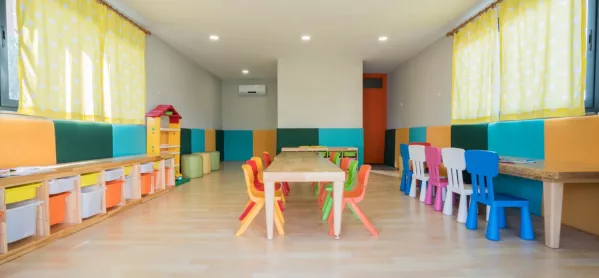- Home
- Proposed changes to EYFS could be ‘detrimental’
Proposed changes to EYFS could be ‘detrimental’

Changes to the Early Years Foundation Stage (EYFS) must recognise the framework is “world class” according to a new report.
And it said that sidelining personal development in the curriculum, which sets out goals for pre-school children, in favour of literacy or numeracy skills could be “detrimental” to young children’s education.
News: New early years goals revealed
Related: Fears of a ‘technical, functional’ early years curriculum
Quick read: Proposed new Early Learning Goals - full details
The study - Getting it right in the Early Years Foundation Stage: a review of the evidence - was compiled by a coalition of 12 early years organisations and will be launched this evening alongside initial findings from a survey of 3,000 early years’ practitioners.
The review began in response to possible government changes to the EYFS.
In July 2018, the Department for Education published a review of the early learning goals which are included in the EYFS. The proposed new goals have been piloted in 25 schools.
The proposals aimed to ease the workload of early years’ teachers when gathering assessment data, as well as creating specific early learning goals to narrow the “language gap” between disadvantaged children and their peers.
But today the report said this review was, in fact, “a comprehensive rewrite of the EYFS Statutory Framework”.
“Many in the early years’ sector were surprised that such an extensive process of change had been embarked upon with very little engagement with sector representatives and experts,” the report said.
In the piloted version of EYFS, there is no longer a need to assess children at the end of Reception year on the mathematical area of “shape, space and measure” or on their ability to use technology, such as computers and cameras.
But the report wants to see shape, space and measure kept as an early learning goal because of its “key role” in maths - and wider science - attainment.
“Regarding shape, space and measures, there is growing research to suggest that, rather than omitting these from the early learning goals, spatial reasoning in particular should be fostered,” the report said.
And it added: “Focusing too soon on literacy and certain mathematical outcomes during the foundation years may be detrimental to the longer-term attainment of those children who are not yet secure in oral language outcomes, including an understanding of how language works in the wider social and cultural context,” the report said.
It recommended a broad approach be kept, stating: “Care must be taken that delivery of the EYFS is not skewed towards particular areas of learning at the expense of others.”
The report also advised that while there was little evidence that EYFS should be changed, greater prominence should be given to characteristics of effective teaching and learning - which include playing and exploring, active learning and creating, and thinking critically - to help all children, including the most disadvantaged, to be ready to learn at the start of key stage 1.
And it also suggested acknowledging the different needs of summer-born children. It advised that adjustments be made to the ELGs to reflect the younger age of these children and address their “perceived under-achievement”.
The launch also published findings from a survey of 3,000 early years practitioners. Survey responses showed that excessive workload is not a result of the current EYFS framework.
Instead, high levels of work have been driven by the interpretation of Ofsted requirements about evidencing children’s attainment, and pressure from leaders, managers and local authorities to gather large amounts of data about children’s progress.
Practitioners also reported that closing the “language gap” between disadvantaged children and their peers did not require changes to the EYFS, with 87 per cent of respondents reporting that EYFS meets children’s needs in communication and learning “well” or “very well”.
However, they said the sector needs more professional development in this area, including access to speech and language therapists, and increased resources so that staff have more time to work with children and their parents and carers, especially in relation to the home learning environment.
Last year, the government pledged to halve by 2028 the number of children who start school without the speaking or reading skills they need.
Beatrice Merrick, chief executive of Early Education, said: “The EYFS is a world-class framework that puts the child at the centre of play-based learning. It’s not perfect - but any changes need to be sensitive to what it gets right.
“This extensive evidence base gives government the opportunity to revisit the proposed changes to the EYFS and come up with a much-improved draft before going out to consultation with the sector.”
Michael Freeston, the Early Years Alliance’s director of quality improvement, said: “This is a significant report which needs to be taken seriously by government. The findings show that the current framework is doing its job - practitioners are happy delivering it and children are getting the early education they need.”
“That is the benchmark any changes to the EYFS need to meet and the best way for government to achieve that is ensure that proposals are informed by robust evidence before full consultation with the sector.”
The DfE has been contacted for comment.
Keep reading for just £1 per month
You've reached your limit of free articles this month. Subscribe for £1 per month for three months and get:
- Unlimited access to all Tes magazine content
- Exclusive subscriber-only stories
- Award-winning email newsletters



